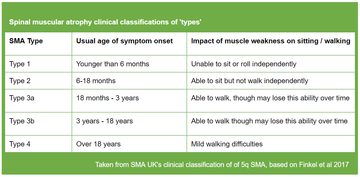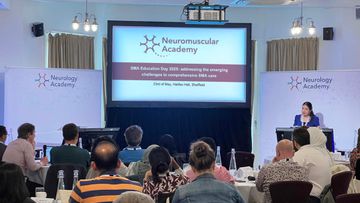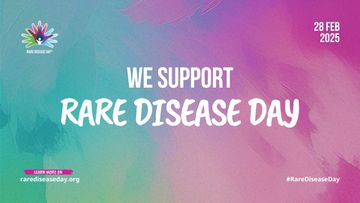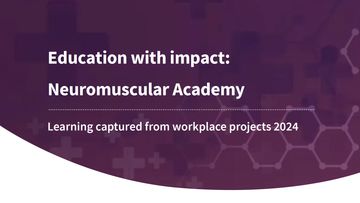First ever national pathway for adult SMA launches
NewsPlease note there is now an updated version of the Spinal Muscular Atrophy: Adult Care Pathway which can be viewed here.
Spinal muscular atrophy (SMA) is a genetic disease causing progressive muscle weakness and loss of movement. It affects people at different ages, in different ways, and with different rates of progression depending on the form of SMA.
Around 71 people in the UK are born every year with 5q spinal muscular atrophy (SMA) - the most common form. Around 41 of these people will be affected by SMA before the age of six months whilst others will develop the condition in early childhood, their teenage years, or even adulthood. When they develop SMA will affect the impact it has on their lives, from their muscle control and function which in turn can affect their movement, breathing and eating (table 1), to their skeletal frame.

Table 1: 'Type' of 5q SMA and impact on muscle function
With advances in medical care, the outlook for SMA has improved and the known natural history of the disease is being rewritten.
Until recently, there was little treatment for SMA whatever the point of onset. People with SMA, many of whom may be severely disabled, have often unfortunately fallen through the cracks in care. However, recent advances in treatments have changed both the management of the condition and the outcomes for those living with it. Appropriate treatment coupled with multi-disciplinary, supportive management can provide, not only a stablising of their condition, but improvement in muscle function and abilities, in some cases.
Now, the first ever national pathway for adult SMA has been developed through expert consensus to provide a basis for improved education and understanding amongst practitioners, and ultimately improved support for all those living with SMA.
Spinal Muscular Atrophy: Adult Care Pathway
It is essential that those living with SMA and their healthcare professionals are made aware that there is now the potential for treatment so that they are assessed and given the option for the appropriate treatment and support, and provided with the care they both need and deserve to live their best lives. The difference that can be made to someone's quality of life through even the smallest muscle function maintenance is significant. Enabling a person to retain the use of their finger movement, for example, can mean independent wheelchair-propulsion and an ability to communicate and connect with others and the wider world through digital means.
The changes in treatment, and therefore outcomes, for infants, children and adults with SMA has given new hope to those affected by the condition, and a renewed urgency to educate healthcare practitioners across primary, community and secondary care regarding the condition itself and how it affects people's lives, as well as how to best treat, manage, and support those living with it.
The adult SMA pathway is just one element of education being developed to support healthcare professionals in this. The first ever paediatric pathway for SMA was launched in May alongside a short animation on early detection and red flags in infants with SMA. An educational webinar on what SMA is and how to treat and manage it, recorded by experts in the field, was released earlier this month and a 2 day training course, 'SMA Basecamp', will be available this November.
For more information, and to access all of these resources, visit Neuromuscular Academy.
Prevalence information was gathered from voluntary organisation SMA UK, accessed via smauk.org.uk/what-is-spinal-muscular-atrophy

This activity has been supported by sponsorship from Biogen Idec Ltd. The sponsor has had no control over the educational content of this activity.
Related articles

Outstanding feedback for SMA Education Day 2025

Rare Disease Day 2025

Spinal muscular atrophy: education with impact
Raising awareness, improving outcomes
Neuromuscular Academy is the first bespoke course for healthcare professionals to receive expert training in neuromuscular conditions like spinal muscular atrophy.